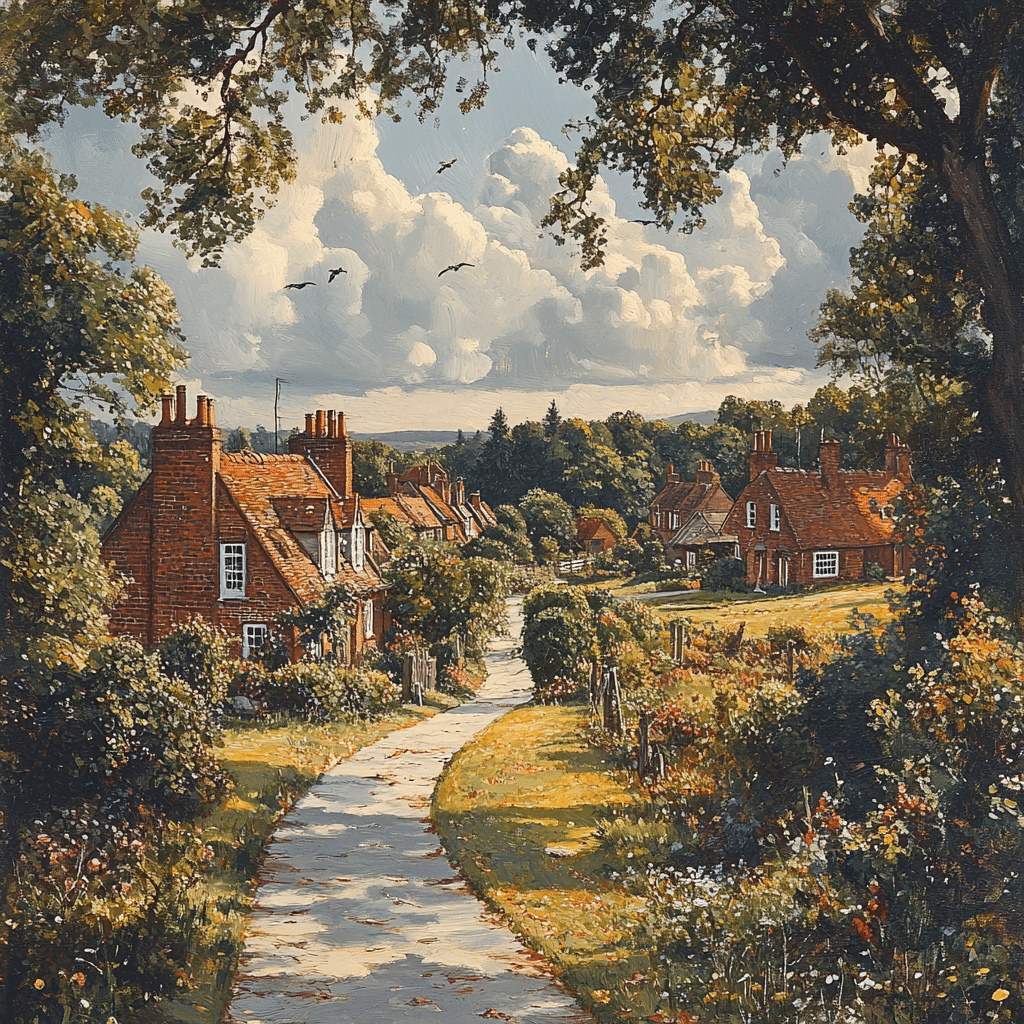Stoke Mandeville is more than just a charming village nestled in Buckinghamshire; it’s the heart and soul of the Paralympic movement. With humble beginnings, this small community became the birthplace of a global phenomenon, thanks to the remarkable vision of Dr. Ludwig Guttmann. This Jewish neurologist fled Nazi Germany and found a new purpose in England, where he would sow the seeds of a revolution in sports for people with disabilities. In 1944, he organized the first sports competition for spinal cord injury patients at Stoke Mandeville Hospital, an event that would pave the way for what we now know as the Paralympic Games.
As we delve into the rich history of Stoke Mandeville and scrutinize its pivotal role in developing the Paralympics, we not only honor the village’s legacy but also explore its enduring impact on inclusivity and sportsmanship. The journey begins here, where determination, innovation, and compassion converge to create an inspiring narrative of resilience and achievement.
The Historical Significance of Stoke Mandeville in the Development of the Paralympics
Stoke Mandeville isn’t just a location; it’s a symbol of hope and a testament to how one man’s vision can reshape the world. Dr. Guttmann’s belief in rehabilitative sport as a critical component of recovery for injured servicemen marked a transformational era. The inaugural competition he initiated in 1944 featured 16 enthusiastic players from various hospitals, capturing the essence of competitive spirit among athletes with disabilities.
This humble event, known as the Stoke Mandeville Games, became a groundbreaking initiative, expanding the rehabilitative nature of sports beyond casual activities into organized competitions. By promoting the idea that athletes with disabilities deserved the same opportunities as their able-bodied counterparts, Dr. Guttmann set a precedent for how society perceives disability within the realm of sports.
The influence of Stoke Mandeville spread far beyond its village borders. Dr. Guttmann’s work sparked a global awareness that led to the formation of the International Paralympic Committee in 1989, ensuring that the Paralympics would be celebrated worldwide. Today, Stoke Mandeville not only stands as the birthplace of the Paralympic movement but as a historical cornerstone from which countless athletes have drawn strength and inspiration.

Top 5 Milestones in the Evolution of the Stoke Mandeville Paralympics
The story of the Stoke Mandeville Paralympics is rich with milestones that have marked its evolution into a significant global event. Here are five crucial moments that stand out:
Celebration of disabled athletes began here. Dr. Guttmann organized the inaugural games, setting a precedent for inclusivity in sports.
Rome played host to the first international competition for athletes with disabilities, establishing the foundation for the Paralympic Games as we know them. Over 400 athletes from 23 countries showcased their remarkable skills.
The first-ever Winter Paralympic Games took place in Örnsköldsvik, Sweden, initiating a new chapter that broadened the spectrum of sports available to athletes. This was a significant stride in recognizing the diverse talents of disabled individuals.
During this transformative decade, the Paralympics gained traction, paralleling the Olympic Games in sponsorship and media coverage. Stoke Mandeville’s historical influence championed this escalating visibility.
The 2012 London Paralympic Games shone a spotlight on Stoke Mandeville once again. Renowned athletes like Ellie Simmonds and David Weir captivated audiences, embodying the very essence of determination and triumph.
By focusing on these key milestones, we uncover how Stoke Mandeville has continually influenced the growth and recognition of the Paralympic movement. Each event not only highlighted athletic prowess but also contributed to shaping societal views on disability.
The Cultural Impact of Stoke Mandeville on Disability Sports
The legacy of Stoke Mandeville is not just about competition; it has profoundly reshaped societal attitudes towards disability in sports. Athletes emerging from this illustrious history are not merely competitors; they are powerful role models who redefine limits and inspire future generations. Take for example wheelchair rugby star Martin Mansell and sprinter Hannah Cockroft; their successes capture the spirit of Stoke Mandeville, illustrating strength and resilience over adversity.
Moreover, Stoke Mandeville stands at the forefront of promoting inclusive sporting initiatives. Programs like “Get Set” encourage young individuals, regardless of their abilities, to engage in sports. By fostering a culture of inclusion and participation, Stoke Mandeville helps cultivate a community that recognizes the value of diverse abilities.
Additionally, the internationally-renowned National Spinal Injuries Centre in Stoke Mandeville Hospital has become a beacon of hope, providing comprehensive rehabilitation and pioneering care. The hospital plays an essential role in not only treating individuals but also enabling athletes from various backgrounds to pursue their dreams in sports.

Future Prospects for Stoke Mandeville as a Center for Paralympic Excellence
Looking ahead, Stoke Mandeville is set to expand its influence as a hub for Paralympic sports. With a variety of adaptive sports programs in place, the village is poised to continue fostering athletic talent and empowerment. The Stoke Mandeville Stadium stands as a prominent facility that serves as a training center and event space, ensuring that events keep the spirit of competition alive.
Given today’s rapid technological advancements, Stoke Mandeville is at the cusp of revolutionary changes in sports equipment and training methods. Projects like Project RAMP (Researching Advances in Mobility and Performance) aim to blend technology with athletic performance, discovering innovative ways to enhance sports for the disabled community.
Furthermore, the village’s commitment to community safety and low crime rates contributes to a secure environment where families can thrive. This stability could foster rich talent pools, bringing future champions into the spotlight. Stoke Mandeville is more than just an athletic center; it’s a sanctuary where dreams take flight.
Innovative Wrap-Up
Stoke Mandeville embodies the transformative power of sports and the inclusive spirit of community. From a small hospital initiative to a global movement, the village has inspired countless lives through its passion for empowering athletes. As we progress into 2024, Stoke Mandeville remains a guiding light for resilience, innovation, and community spirit, continuously challenging societal norms around disability.
The journey from the Stoke Mandeville Games to the grand stages of the Paralympics is a powerful reminder that barriers can be broken. Stoke Mandeville’s legacy will not only energize the athletes of tomorrow but will also serve as an enduring message that with perseverance, anything is possible. The eyes of the world may be watching, but the heart of the Paralympic movement beats right here in Stoke Mandeville.
Stoke Mandeville: The Birthplace of the Inspiring Paralympics
A Charmed History
Stoke Mandeville might seem like just another quaint village in Buckinghamshire, but it’s got a history that packs quite a punch. Did you know this was the birthplace of the Paralympic Games? Back in 1948, Dr. Ludwig Guttmann organized a sports competition for patients at the Stoke Mandeville Hospital as part of their rehabilitation. This modest event sprouted into the global movement we recognize today, promoting inclusivity in sports. Kind of like how some trends, like the latest updates from Boruto Blue Vortex, can catch on rapidly, Stoke Mandeville’s story took off and changed lives.
Fun Facts and Hidden Gems
You’ll also find a unique blend of culture and community spirit here. For instance, the village is home to the stunning Stoke Mandeville Stadium, which has been pivotal in hosting various sports events. It’s a bit like the culinary delights you’d find at Wayfare Tavern, where good company and spirit reign supreme. Plus, Stoke Mandeville isn’t just about the past; it’s about embracing the future too. Ironically, much like the lively discussions around Elon Musk and Amber Heard, the future of sports is evolving to be more inclusive and innovative.
Symbols of Success
An interesting thing to note is that Stoke Mandeville has its own cultural quirks, including the iconic residents who hail from this charming village. Just like 222 meaning reflects positivity and encouragement, the achievements recognized in Stoke Mandeville uplift and inspire countless athletes around the globe. Whether it’s a victory in the Paralympics or community initiatives, the spirit of resilience shines bright here.
So, as you explore Stoke Mandeville, whether you’re wandering through its picturesque lanes or engaging in community events, remember—it’s a village that’s not just rich in history, but brimming with significance for the global community. From its deep roots in sports to the vibrant life that continues to unfold today, Stoke Mandeville is more than just a place; it’s a testament to the power of determination and inclusivity.

What do they do at Stoke Mandeville Hospital?
Stoke Mandeville Hospital offers a range of services, including an Accident & Emergency department, maternity services, critical care, eye services, and a burns and plastics unit. It’s also home to the National Spinal Injuries Centre, one of the largest specialist spinal injuries units in the world.
Is Stoke Mandeville a good place to live?
Living in Stoke Mandeville is quite peaceful, thanks to its low crime rates. The community is active in safety initiatives, making it a great spot for families looking to settle down in a secure environment.
Is Stoke Mandeville the birthplace of the Paralympics?
Yes, Stoke Mandeville is known as the birthplace of the Paralympic movement. It’s where the first-ever competition for wheelchair athletes was held in 1948, leading to the development of the Paralympics as we know them today.
Why do the Stoke Mandeville Games matter?
The Stoke Mandeville Games are significant because they marked the beginning of organized competitive sports for athletes with disabilities. This event laid the foundation for the modern Paralympics and raised awareness for athletes with disabilities.
What is Stoke Mandeville famous for?
Stoke Mandeville is famous for being the origin of the Paralympic movement and for its world-class healthcare services, particularly in spinal injuries and rehabilitation.
What is Stoke hospital known for?
Stoke Mandeville Hospital is known for its exceptional services in treating spinal injuries and for having the National Spinal Injuries Centre, which is internationally recognized for its specialized care.
Is Stoke a cheap place to live?
Stoke Mandeville is generally considered affordable compared to many other places in the UK, making it accessible for families and individuals looking for good living options without breaking the bank.
What type of injuries are treated at Stoke Mandeville?
Stoke Mandeville treats a variety of injuries, with a strong focus on spinal injuries, along with providing critical care and other specialized medical services.
What is the median household income in Mandeville LA?
The median household income in Mandeville, Louisiana, varies but is around $60,000. It’s best to check with local sources for the most current figures.
Why are they called Paralympics?
They’re called the Paralympics because the term combines “parallel” with “Olympics,” indicating that these games run alongside the Olympic Games, showcasing athletes with disabilities.
What happened to Hunter Woodhall?
Hunter Woodhall is a well-known Paralympic athlete who gained recognition for his achievements in track and field. He competes with prosthetic legs and has inspired many through his story and athletic success.
What disability qualifies for the Paralympics?
Disabilities that qualify for the Paralympics can include a range of physical impairments, visual impairments, and intellectual disabilities. Each sport has its own classification system to ensure fair competition.
Why was it called the Stoke Mandeville Games?
The Stoke Mandeville Games were named after the location where they were first held, Stoke Mandeville Hospital, and the event was created to promote sporting opportunities for injured war veterans and others with disabilities.
What does NPO mean in Paralympics?
NPO in the context of the Paralympics stands for “Non-Profit Organization,” which often refers to the governing bodies that oversee the sports and events for athletes with disabilities.
What country has the most Paralympic medals?
The country with the most Paralympic medals is the United States, having consistently performed well across various sports at the Paralympic Games.



